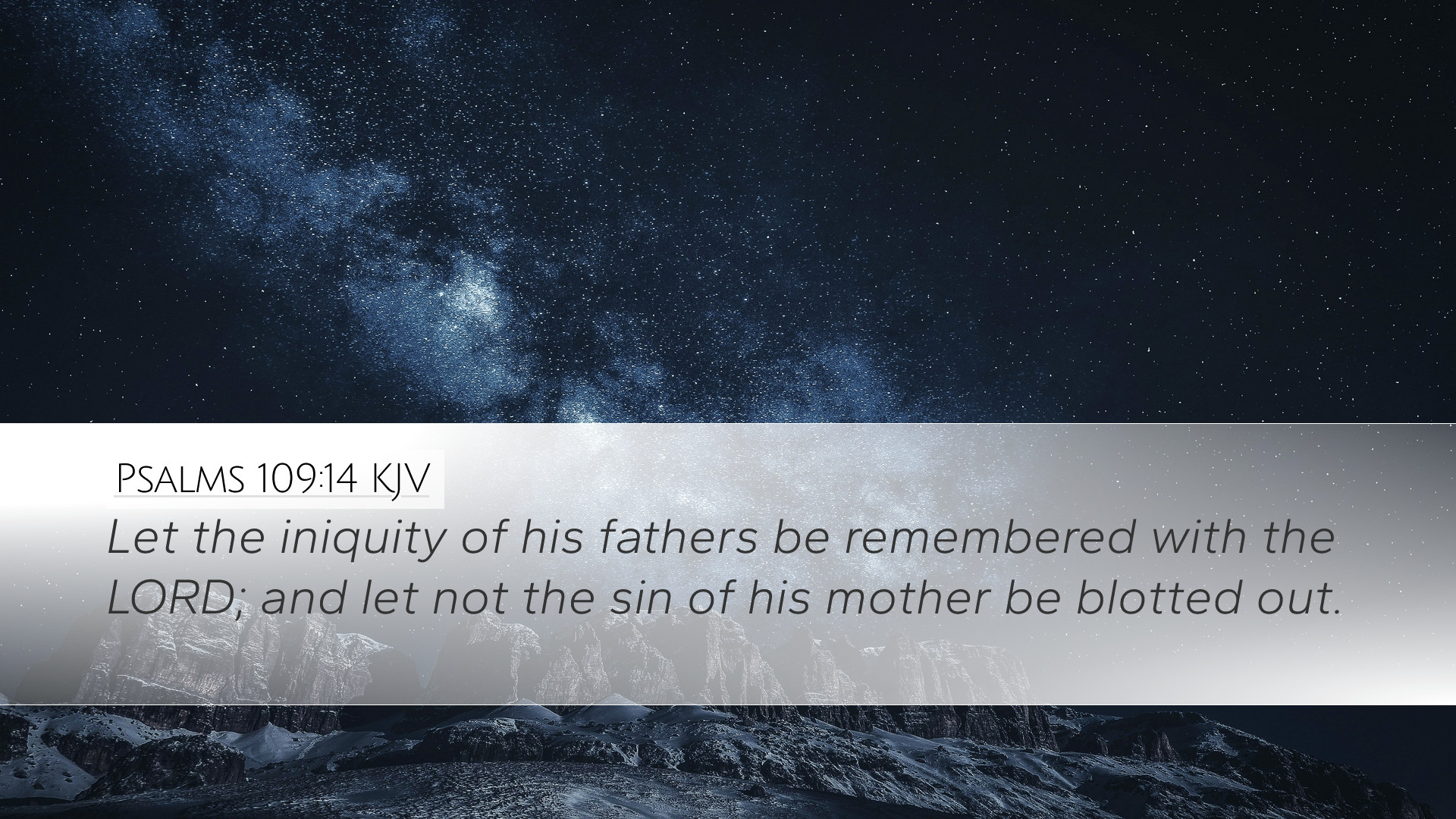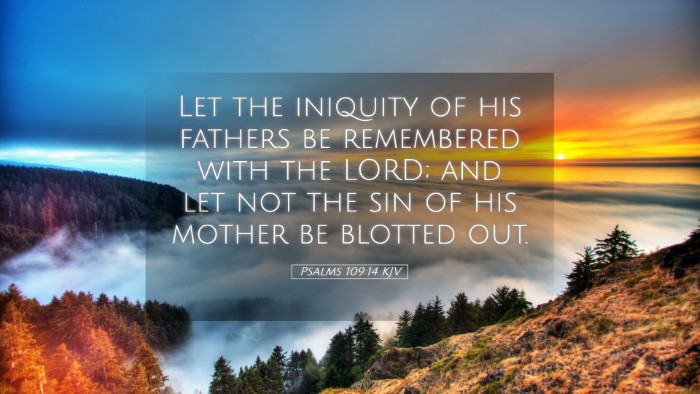Psalms 109:14 - Commentary and Insights
Bible Verse: "Let the iniquity of his fathers be remembered with the LORD; and let not the sin of his mother be blotted out."
Introduction
This verse from Psalm 109 delves deeply into the themes of justice, sin, and divine remembrance. The psalm is often attributed to David, reflecting his anguish and plea for justice against adversaries. Within this context, Psalm 109:14 articulates a prayer that calls for God to remember the iniquities of his enemies' ancestors. This verse offers rich material for theological exploration and personal reflection, especially regarding justice, retribution, and God's character.
Context and Background
Psalm 109 is categorized as an imprecatory psalm, where the psalmist calls upon God to enact judgment upon his enemies. Such psalms can be challenging for contemporary readers to digest, but they serve a vital purpose in reflecting the raw emotions and desires for justice experienced by the faithful. David’s lament draws attention to the severity of his plight and the longing for vindication.
Commentary Insights
Matthew Henry's Commentary
Matthew Henry suggests that this verse conveys a deep desire for divine justice and accountability, not merely towards the enemies of David but extending to their lineage. The phrase "Let the iniquity of his fathers be remembered" indicates a call for God to act upon the historical sins of the adversary's family. Henry emphasizes that this is not a vindictive wish but a plea for God's righteous judgment to prevail. When invoking past iniquities, the psalmist acknowledges the biblical principle that the consequences of sin often extend beyond the immediate actor, impacting families and communities.
Albert Barnes' Notes
Albert Barnes elaborates on the implications of familial iniquity. He notes that the psalmist's appeal to the Lord to remember the sins of the father and mother highlights the notion that sin carries weight and ramifications that can affect subsequent generations. Barnes discusses how such a request reflects deep-seated emotions, born out of the pain inflicted by unjust enemies. This is significant in light of the covenantal understanding of righteousness and sin in the Hebrew Scriptures, where familial responsibility was taken seriously.
Adam Clarke's Commentary
Adam Clarke provides additional theological reflection on the verse, arguing that invoking the sins of forebears is a way of pleading for justice in a context where moral accountability is lacking. Clarke proposes that the depth of the cry to remember these sins signals the psalmist's recognition of God as the ultimate arbiter of justice. In a sense, this line serves as a profound act of faith in God's sovereignty, implying that past injustices can and should be confronted in prayer.
Theological Implications
The appeal to remember familial iniquities raises questions about justice and mercy within the divine character. It reflects the belief that God is not only a God of forgiveness but also a God who upholds righteousness and truth. This brings to the forefront the tension between retribution and grace, particularly in light of New Testament teachings that call for love and forgiveness.
Moreover, interpreting this verse in light of the entirety of Scripture leads to an understanding that while the psalmist is invoking divine justice, the gospel calls for a radical redefinition of how believers interact with adversaries. Jesus’ teachings encourage turning the other cheek, illustrating the fullness of grace and mercy that complements God's justice.
Practical Applications for Pastors and Theologians
- Understanding Sin's Impact: This verse reminds pastors and theologians to consider the broader implications of sin within the community and how personal actions can have generational consequences.
- Engaging with Imprecatory Psalms: Pastors may find it beneficial to address the emotional weight of such psalms in the context of the congregational experience, helping believers process their struggles with injustice while pointing towards God's justice.
- Integrating Grace and Justice: Scholars and preachers can reflect on how this text illuminates the balance between justice and mercy — a dynamic that must guide pastoral care and community ethics.
- Encouraging Honest Dialogue: This verse opens a pathway for honest prayer and lament within the church, inviting believers to articulate their feelings in a sacred space before God.
- Historical Reflection: Engaging with the historical context of the psalm may lead to rich discussions about how community sins resonate in contemporary issues of social justice and reconciliation.
Conclusion
Psalms 109:14 invites readers into a profound recognition of sin, justice, and the character of God. Through the combined wisdom of Matthew Henry, Albert Barnes, and Adam Clarke, we gain insights that not only clarify the original intent of the psalm but also challenge us to engage deeply with the implications of sin and its legacy. For pastors, theologians, and students, this verse serves as a rich text from which to draw inspiration for understanding God's ways as they intersect with human experience and suffering.


